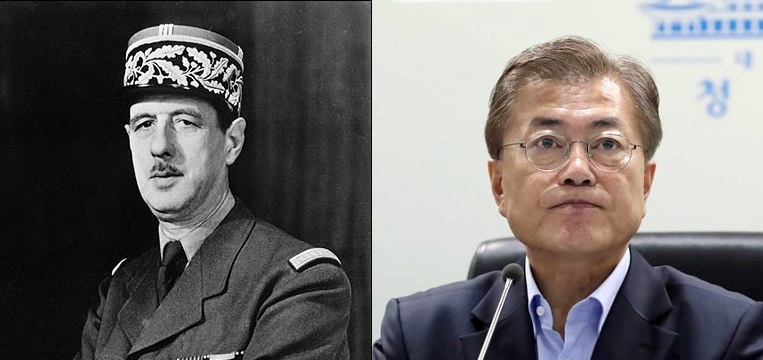The Peninsula
Les Présidents: Moon Jae-in, Charles de Gaulle, and the 360 Presidency

By Mark Tokola
Historical analogies are fraught. Things never happen exactly the same way twice, and assuming they do can be misleading. Nevertheless, historical parallels can offer useful perspectives. For example, an advisor to South Korean President Moon Jae-in who recently visited Washington remarked that one element of President Moon’s philosophy for South Korea was a “360 degree defense.” This sounds commonsensical; nations prudently should be prepared to defend themselves against potential threats coming from any direction. But, for those old enough to remember, it also pushed the memory button of French President Charles de Gaulle’s January 1968 announcement that France would pursue a policy of “defense tous azimuts,” or all-around defense. The parallels between Moon Jae-in and Charles de Gaulle do not stop there.
Charles de Gaulle always had an uneasy relationship with the United States. On one hand, President de Gaulle withdrew France from NATO and obstructed European integration. On the other, he was the U.S.’ strongest ally during the Cuban Missile Crisis, accurately predicted German unification and the fall of the Soviet Union, and presided over an unparalleled period of French economic growth. Presidents Kennedy and Nixon both held de Gaulle in high regard. He has topped polls as “the greatest Frenchman of all time.” (One assumes Napoleon did not earn the accolade because of being dictatorial and, in the end, losing.) The lesson of the comparison between de Gaulle and Moon may be that it is possible, perhaps even advantageous, for the United States to have an ally with which it sometimes disagrees.
One contextual parallel between the two presidents is that Moon and de Gaulle both came to power following a domestic political crisis. The collapse of the ineffective French Fourth Republic in 1958 was followed by the de Gaulle presidency and the founding of the Fifth Republic. Charles de Gaulle promised, and delivered, constitutional reforms which have endured. Moon Jae-in similarly has taken power following a crisis of governance and has promised constitutional reform.
Charles de Gaulle generally is perceived as a conservative, but on the economic front he favored state intervention in the economy, including a move to rein in the largest French companies by requiring that they share profits with their workers. By 1964, France had overtaken the UK economically for the first time in modern history. In a similar vein, Moon Jae-in has promised government action to boost economic performance, and his attitude toward Korea’s largest corporations, like de Gaulle’s, is that they should contribute more to the well-being of the citizenry.
But it is in the foreign policy arena that the comparison might be most instructive. De Gaulle believed that the Soviet Union posed a threat to Europe, but also believed that it was necessary to engage with the Soviets as well. He traveled to the Soviet Union in 1964 in an early attempt at détente, all the while believing that the Soviet system had no future. De Gaulle did not have complete faith in what he considered a weakening American extended nuclear deterrence, and eventually concluded that France needed an independent nuclear arsenal with which it could defend itself. De Gaulle chose to balance France’s U.S.- and UK-oriented Atlanticism with a European “Continentalism” that he defined as stretching from the Atlantic to the Urals. He sought the closest possible ties with France’s old enemy, Germany, and held out the possibility of cooperation with Russia (de Gaulle never called it “the Soviet Union”).
It appears that Moon Jae-in has a similar instinct towards broadening the foundation of South Korea’s foreign policy stance. He favors an enduring, close relationship with the United States, but also believes that South Korea could simultaneously have a positive relationship with China in a more closely integrated Asia, balancing a continuing U.S. Pacific-orientation with a new Asian “Continentalism” among countries of the region. Continuing the parallel between the two presidents, Moon may view Japan with the same skepticism with which de Gaulle viewed the U.K., cooperating when in both countries’ interests but watching it with a wary eye. Though he doesn’t share de Gaulle’s uncertainty about the U.S. nuclear umbrella.
De Gaulle’s assertiveness in promoting what he perceived as France’s national interest sometimes strengthened and sometimes undermined American diplomacy. But, taking the long view, it also demonstrated that countries that share basic values regarding democracy, free markets, and human rights generally will support each other’s strategic direction and foreign policy interests — even if they disagree from time to time on specific policies. Similarly, the U.S. government may not always agree with President Moon’s perception of South Korea’s national foreign policy interests. This may not lead to the most comfortable kind of alliance, but it is still one that can endure, even beyond the temporary issues raised by North Korea. It is worth recalling that throughout their long and sometimes awkward history, the United States has never been at war with France or with South Korea, a rare distinction.
Mark Tokola is the Vice President of the Korea Economic Institute of America. The views expressed here are his own.
Images from wikicommons and arif_shamin’s photostream on flickr Creative Commons.
